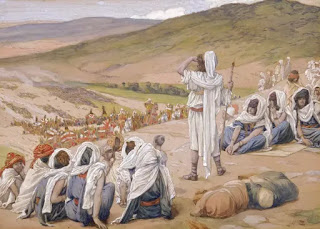Parasha Vayishlach offers many options for somebody wishing to discuss its lessons. We are most familiar with the story of Jacob meeting Esau after many years apart: How Jacob and his household wait at the side of the river; how he goes off by himself and has a vision, then wrestles with an angel, who gives him a new name – and how we know the supposed man is a messenger of G-d because only G-d gives names; then the reconciliation and parting of the brothers.
I originally decided take inspiration from the beginning of 32:25: “Now Jacob was left alone”. Then I noticed that 32:8 says that the previous night “Jacob was terrified.” But look at what he does next.
Jacob doesn’t fall on his face in prayer. He doesn’t bewail the situation. We don’t read of him speaking to his family, or taking council with his wives and household leaders. He doesn’t send for help. Instead, Jacob takes action.
He prepares. He plans. He isn’t frozen by his fear, he considers options and implements the one that he thinks has the best chance of success. Yes, he does pray – but only after he separates his household into two camps. Only after he prepares for what could happen when his brother arrives. Instead of asking for inspiration, he asks to be saved from what could happen, and reminds G-d that he is following G-d’s requests, that he has apparently been favored by G-d, and that he hopes the preparations will be successful.
G-d does not answer. Jacob does not get instructions the way Noah did (to build an ark) or that Abram gets with the Akedah. And when morning comes, Jacob makes more preparations. He sends a series of gifts to his brother, and then puts his family and remainder of his household across the river, while he awaits his brother. Jacob makes all these preparations – and this time, he does not ask G-d for a sign. Instead, Jacob takes some time to be alone.
Many people have read Jacob’s wrestling as a metaphor, as Jacob makes the final decisions before the reunion with his brother. Whether real or imagined, the key to me is that Jacob is alone, without anybody to help him, or with whom he can discuss his decisions. He has no sounding board, for even in the description of the wrestling, there is no record of any communication. They only converse when the angel has to leave, at dawn. And then Jacob walks back to his family and household, limping and alone.
As he does so, Jacob sees Esau approaching, and he makes one final preparation, to organize his family and household, before his brother arrives. He still doesn’t know whether Esau will welcome him or fight, but Jacob has considered and prepared for all possibilities. Again, we see that Jacob doesn’t pray for instructions. It is, in many ways, like the final shuffling of pages or check of a slideshow presentation before ascending a podium or going onstage. Many of us have the times when we have prepared all we can, and we don’t know until the event begins whether it is enough.
I take all of this as a recommendation that when you are faced with a daunting situation, especially one that terrifies you, you should tamp down the fear; prepare as much as possible; then take a few minutes to calm yourself before stepping into the unknown. When you do, may the result be as positive as the one that Jacob received, in Chapter 33:4, when “Esau … ran to meet him, and embraced him, and fell on his neck and kissed him. And [the brothers] burst into tears.”
 |
| Jacob Sees Esau Coming to Meet Him James Jacques Joseph Tissot, circa 1896-1902 The Collection of the Jewish Museum |
 |
| Dough in two simple twists. I did the previous loaf in eight balls set in two rows of four and wanted to try something different. |
 |
| Twists side-by-side in the pan, ready to rise. I wasn't trying for a fake braid, but they worked out this way. |
 |
| Baked loaf. |


No comments:
Post a Comment